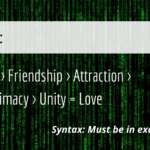h2>Dating : How To Let Go When It’s Unhappily Ever After
It’s a bad relationship but knowing that doesn’t make it any easier to leave.
By Karen Young
If life ran like a storybook, the person we fall in love with would not be the person who broke us. Sadly, we humans tend to be a bit more human than that. We fall in love, we commit, we get hurt — over and over — and we stay. People need people, but sometimes the cost is a heavy one.
A bad relationship isn’t about being on the downward slide of the usual relationship ups and downs. It is one that consistently steals your joy and follows you around with that undeniable clamor that this isn’t how it’s meant to be.
Sometimes the signs are clear — emotional and physical abuse, constant criticism, lying, cheating, and emotional starvation. Sometimes there is nothing outstandingly obvious — it just doesn’t feel right. Perhaps it did once but that ended long ago. The signs might lie in the loneliness, a gentle but constant heartache, a lack of security, connection or intimacy or the distance between you both.
Sometimes there are circumstances that make leaving difficult. Sometimes though, there’s nothing in your way except you. Some of the signs that you might be addicted to the relationship are:
- You know it’s bad, but you stay.
- You want more for yourself, but you stay.
- There are important needs in you that are so hungry (intimacy, connection, friendship, love, security, respect), and you know in this relationship they’ll stay that way. But you stay.
- You have tried ending the relationship before, but the pain of being on your own always brings you back.
Leaving any relationship is difficult. Leaving a bad one isn’t necessarily any easier. The shift from powerless to empowered is a gentle one but lies in the way you experience the relationship. It often takes as much resourcefulness, energy and strength to stay in a bad relationship as it does to leave. With a shift in mindset, experience, and expectation, the resources you use to stay and to blind out the seething hopelessness of it all can be used to propel you forward.
The pull to live in the past (the way it was/ the way I was) or in the future (it will get better — I just need to find the switch) can be spectacular, but the energy to move forward exists fully in the present. It’s always there, but you have to be in the present to access it. To do this, fully experience the relationship as it is, without needing to change it or control it.
The way we think about selfishness is broken. Selfishness is about recognizing what you need and doing what you can to meet those needs.
This might be scary, particularly if the environment you are in is hostile or lonely, but the only way to be okay with leaving what you have is to fully experience how broken it is.
No relationship is perfect. All couples fight and hurt each other and say and do things they shouldn’t. That’s a normal part of living and loving together. The problem comes with having to repeatedly live in the past or the future to tolerate the present — the abuse, the harm, the insecurity, the jealousy, the loneliness and the grief of the relationship as it stands — just so that it’s easier to stay.
Keep a record of how you feel in the relationship, the good and bad. If writing isn’t your thing, take a photo of your face at the same time every day. You’ll see it in your eyes. Photos and journaling will capture the intimate, day to day detail of you in this relationship. Set a time period — weeks or months — and at the end take a look over your photos or your writing.
Can you see patterns? What do you notice about the things that hurt you and the things that feel good? The frequency? The intensity? What do you see in the photos? Can you see the life in you? Or has it been drained away? Is this the person you want to be? Or is it a faded, sadder version? This can help to see your experience in the relationship for what it is — stripped of the filters and the softening that comes with time.
The connection between the mind and the body is a powerful one. If you shut down the messages that are coming from your mind, your body will take over. There will be signs in the way you hold yourself, the sensations in your body (heaviness, heartache, and tension) and the way it works. Has your body slowed down? Is there physical pain? Does it ache? Does it feel heavy? Restless? Tired? Drained? Do you feel your body withering, scrunched or as though it’s holding back? If your body could speak, what would it want you to know?
Try this exercise; Finish this sentence:
‘My body is …’ (tired/crumpled/hurting — whatever fits for you)’.
Now, keep your ending but replace the words, ‘My body is’ with ‘I am’ or ‘My life is’.
Notice what happens when you do that.
Notice what you do to shift away from your reality. Are there unhealthy behaviors you do to stop from feeling bad? Or maybe there are healthy behaviors that you do in unhealthy ways?
Try staying with the discomfort rather than avoiding it. Contained in the pain is the wisdom, courage, and strength you need to find the happier version of yourself and your life.
It’s easy to forget how long you’ve been living with what you don’t want, hoping that one day it will be better. Pick your ‘one day’. Let it be six weeks, six months — whatever feels right for you. In that time, give the relationship everything you’ve got. When that ‘one day’ comes, be honest and act from a place of strength, self-respect, and self-love. The answer will be in front of you.
The way we think about selfishness is broken. Selfishness is about recognizing what you need and doing what you can to meet those needs. Sometimes there will be fallout, but there will also be fallout by ignoring what you need and letting the noise shout you down. You matter. What you need matters. It always has. Sometimes that will mean putting yourself first on your list. This is even more important if it is the only list that has you anywhere near the top.
It’s likely that there will be a rhythm in the relationship that keeps it breathing the way it does. You and your partner will each have a role that keeps each other’s behavior possible. This in no way means either of you is to blame or that either of you deserves to be treated the way you are. What it means is that over time you would have fallen into a way of being together that makes the dysfunction easier and more tolerable — a healthy adjustment to an unhealthy situation.
Lose the fantasy that things will be different. They won’t be.
It’s common in relationships for one person to be the ‘reacher’ and one to be the ‘retreater’. In healthy relationships, this is balanced or the roles shift around. There’s easy flexibility. In unhealthy relationships, these roles become polarized. The more someone retreats, the more the other reaches, and this is where the roles become fixed.
Explore your roles. Which one of you is ‘the commitment-phobe’, ‘the non-communicator,’ ‘the abuser,’ ‘the critic’, ‘the disinterested one’? And who is ‘the ‘enabler’, ‘the victim,’ ‘the helpless one,’ ‘the reacher’, ‘the rescuer’, ‘the justifier’, ‘the fantasizer’. Try shifting out of your role. This will shift the dynamic and either force change or make the dysfunction all the more glaring — and easier to walk away from.
The fantasy of what could be will keep you stuck. Every time. It could be better — so much better — but just not with this person. How do you know? Because you’ve been trying. And you’re tired. And there’s nothing more to give.
The fantasy stands between you and reality and throws flowers at your feet so you never look up and see things as they are.
The more you fantasize about what could be, the more the reality is embellished and changed into something reasonable. The fantasy will persuade you to hold on for a little longer, and always at the cost of moving forward.
Lose the fantasy that things will be different. They won’t be. If you could have lived the fantasy with this relationship, you would have done that by now.
It’s paradoxical, but the more you can accept where you are, the greater the capacity for change. This will let your decisions be driven by information that’s real and accurate, not a glossed up fairy tale image of what could be.
Accept your reality as it is — your relationship, your partner and what it means for you. When you accept the truth, you live the truth. This will expand your courage, strength, and capacity to decide whether this relationship is the best option for you — or not. You will have a clarity that will propel you forward, whatever that might mean for you.
You have to fight for the things you love and the things you believe in, but one of those things has to be you. What would you say to someone you love who was feeling the pain or the deadness that you are feeling?
Inside you are more courage and strength than you will ever need. You are a queen, a king, a fighter, a warrior, you are powerful and beautiful and everything good in the world — and you deserve to be happy. But first, you might have to fight for it. Fight for you the way you would fight for anyone you love — fiercely, boldly, and bravely.
Claim back your power by replacing ‘can’t leave‘ with ‘won’t leave‘. Sometimes circumstances mean that it’s difficult to leave. Whatever you choose to do, do it from a place of strength, not from a place of helplessness.
If you stay, let it be because you have made the decision that this is the best option for you at this moment in time, not because somebody has claimed ownership of your life. Keep your power and your independence of mind, whatever is going on around you. There’s only one of you and you’re too important to let yourself fade into a circumstance or the manipulation.
You might decide to put off making a decision, to give it some time. Make no mistake, this is making a decision — to stay. Own your decision and experience fully what that decision means for you.
Don’t live on the outskirts of your reality by claiming to be somewhere in between committing to the relationship and leaving it. You’re one or the other. In it or out of it. Claiming indecision might feel okay in the short term, but in the long-term, it will just keep you stuck, without the energy you need to move closer to what will be healthier for you.
If the relationship feels bad, then it’s bad for you. That’s the only truth that matters. Fight hard to keep your relationship intact, but when there is no fight left, the truth will be staring you down like a hunted thing.
Only you can decide whether to stay or go, but be mindful of your reasons. Sometimes the bravest, most difficult, and most life-changing things lie not in what we do, but in what we stop doing.
—
This story was originally published on Hey Sigmund and republished on The Good Men Project.




